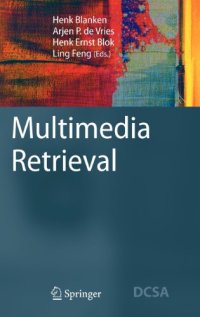
Ebook: Multimedia retrieval
- Genre: Computers // Media
- Tags: Information Storage and Retrieval, Multimedia Information Systems, Pattern Recognition, User Interfaces and Human Computer Interaction, Image Processing and Computer Vision
- Series: Data-centric systems and applications
- Year: 2007
- Publisher: Springer-Verlag Berlin Heidelberg
- City: Berlin; New York
- Edition: 1
- Language: English
- pdf
Retrieval of multimedia data is different from retrieval of structured data. A key problem in multimedia databases is search, and the proposed solutions to the problem of multimedia information retrieval span a rather wide spectrum of topics outside the traditional database area, ranging from information retrieval and human–computer interaction to computer vision and pattern recognition.
Based on more than 10 years of teaching experience, Blanken and his coeditors have assembled all the topics that should be covered in advanced undergraduate or graduate courses on multimedia retrieval and multimedia databases. The single chapters of this textbook explain the general architecture of multimedia information retrieval systems; various metadata languages like Dublin Core, RDF, or MPEG; pattern recognition through Markov models, unsupervised learning, and pattern clustering; various indexing approaches to audio and video streams; interaction and control; the protection of content and user privacy; and search effectiveness and efficiency. The authors emphasize high-level features and show how these features are used in mathematical models to support the retrieval process. For each chapter, there’s detail on further reading, and additional exercises and teaching material is available online.
Based on more than 10 years of teaching experience, Blanken and his coeditors have assembled all the topics that should be covered in advanced undergraduate or graduate courses on multimedia retrieval and multimedia databases. The single chapters of this textbook explain the general architecture of multimedia information retrieval systems and cover various metadata languages such as Dublin Core, RDF, or MPEG. The authors emphasize high-level features and show how these are used in mathematical models to support the retrieval process. For each chapter, there’s detail on further reading, and additional exercises and teaching material is available online.